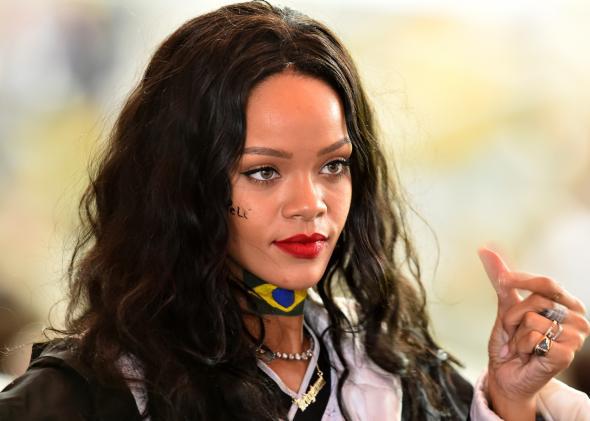Here’s the setup for the one indelible line in the so-so Tina Fey–Amy Poehler comedy Baby Mama. Fey’s uptight yuppie confronts Poehler’s South Philly bigmouth with evidence of her habit of depositing used chewing gum on the furniture. The exec begins sarcastically spinning out a fantasy in which she, the exec, comes home from work, chews “a big wad of Bubblicious gum and stick[s] it under my reclaimed barn-wood coffee table,” because, ho ho, that would never happen in the real world. At which point Poehler ricochets up from the designer couch and yells: “Bitch, I don’t know your life!”
It’s a mic drop: The conversation, and the scene, is over. But in 2008, Baby Mama was the first flowering of a linguistic trend now in full bloom across all media: that of prefacing a statement with bitch for rhetorical effect. These days, proemial bitches have staked out turf with Rihanna’s new single “Bitch Better Have My Money” Kendrick Lamar’s “Bitch, Don’t Kill My Vibe,” and the Nicki Minaj–Madonna collaboration “Bitch, I’m Madonna.” They’ve inspired two songs called “Bitch Please,” the first, by Snoop Dogg, addressed to a female bitch, and the second, by Jessi Smiles, pitched at a male bitch, as the prefatory bitch transcends gender. They frequent hip-hop lyrics, equally adroit at conveying playful hubris (“bitch, I’m a don”), unhinged menace (“bitch, I’m a monster, a no-good bloodsucker”), and scoffing antagonism (“bitch, you wasn’t with me shooting in the gym”). And then there’s the meme-osphere, aswirl with such bitch-headed catchphrases as “Bitch, I’m fabulous,” “Bitch, you guessed it,” and—because such things are not always obvious to bitches—“Bitch, I’m a bus.”
While the device is not exclusively humorous, it often is. Richard Pryor used the construction in a riff about how women refuse to pee in the woods. “Bitch, you ain’t gonna piss in the car!” he shouted. In a (more enlightened) Key and Peele sketch from 2012, two henpecked husbands brag to each other about keeping their wives in line. “I said, ‘Biiiiitch,’ ” they crow, recounting each supposed dressing-down, but only after glancing around nervously to make sure the women are nowhere in earshot.
The prefatory bitch, if I were to animate her, is a zephyr at your statement’s back, blowing it past the shoals of dissent, into the realms of the inarguable. Bitch, says this bitch, you know I’m right. She’s a close cousin to the tautophrase, that breed of circular expression—“you do you,” “haters gonna hate,” “it is what it is”—that finds profundity in the obvious. Don’t use a prefatory bitch unless you are absolutely certain. Beyond certain. Are you Madonna or are you a bus?
What exactly makes the prefatory bitch so satisfying and potent? Something about her matter-of-fact placement at the start of the sentence forecloses disagreement. The natural immediacy of address also lends her oomph, in the way that a 19th-century novel might suddenly snap you to attention by switching to the vocative. (As Charlotte Brontë wrote in Jane Eyre, “Bitch, I married him.”) And the word bitch has always boasted certain superpowers, including part-of-speech elasticity (“that bitch keeps bitching from her bitch face”) and the ability to masquerade as an innocuous female dog. Mostly, though, the term derives force from its, well, rudeness. As degendered as the proemial bitch might seem, she can’t shake her origins as a misogynist slur: “a she dog or doggess,” as Francis Grose wrote in his 1811 Dictionary of the Vulgar Tongue, “the most offensive appellation that can be given to an English woman, even more provoking than that of whore.”
The pelt of transgression hanging around bitch probably accounts for most of its impact. As a sexist insult that got its second wind in ‘90s-era black slang, bitch is a term associated with the marginalized: women and people of color. It serves the power structure, putting down those of inferior social status while elevating the (presumably white, male) speaker. So the nimbus of violation surrounding bitch is twofold: It strikes progressive listeners as glaringly offensive, first of all. (The New York City Council tried to outlaw the term in 2007, five months after it passed a ban on the N-word.) More subtly, however, in the mouths of Drizzy or Rihanna, saying bitch reads as a subversive gesture, an insouciant dip into the oppressor’s lexicon. The speaker flaunts an authority she shouldn’t be able to claim, and it’s thrilling, like: Bitch, I went there. Try and stop me.
The prefatory bitch is uniquely empowering—you need to be a pretty big deal to wield such a fraught word with impunity. Its comedy comes in part from reversed expectations. The refreshment and pleasure in Poehler’s Baby Mama retort stems from the way her working-class character sticks it to Fey’s snobbish yuppie. The Key and Peele sketch delights because its supposedly authoritarian husbands are too terrified to say bitch unless they’re sure their wives aren’t listening. When superstar Christina Aguilera snubbed lesser eminence Valerie Bertinelli at a concert, Bertinelli got her back by snapping, “Bitch, I’m a fan.” Rihanna growling that a bitch better have her money is kind of awesome. Billy Joel saying it would make us squirm.
Of course, bitch has been used as punctuation for a while. “It’s Britney, bitch,” a defiant Spears chanted in 2007, one year before the premiere of Breaking Bad, whose Jesse Pinkman would become the patron saint of the “something, something, bitch” construction. Yet “X, bitch” (exuberant) stands in contrast to “bitch, X” (reproving, disdainful). The first is a jubilant self-assertion, the second a withering put-down. And our culture seems to be experiencing a sea change between the first phrasing and the second. Bitch, better use it right.
